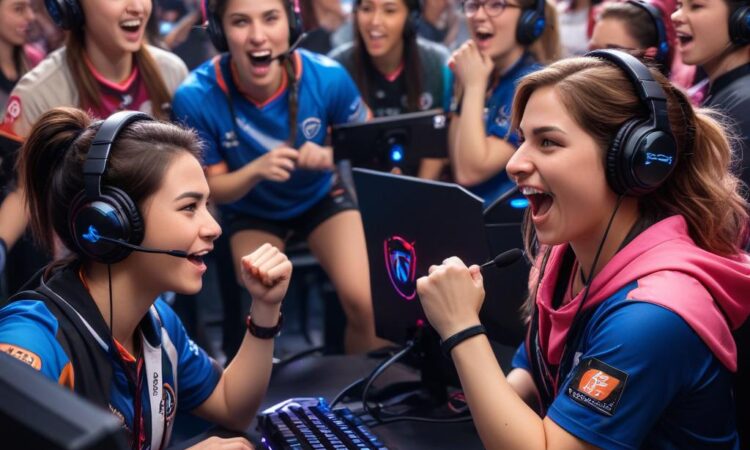The Gender Gap in Esports: Challenges and Initiatives for Gender Equality
The world of esports, once a male-dominated realm, is gradually becoming more inclusive, with a growing number of women carving their own paths to success. However, despite this progress, significant challenges remain in bridging the gender gap. This article delves into the obstacles female esports players face, exploring the systemic barriers and cultural biases that hinder their participation and advancement. Furthermore, it sheds light on the inspiring initiatives being undertaken to promote gender equality in the industry, focusing on tournaments, organizations, and programs specifically designed for women.
The Challenges Faced by Female Esports Players
1. Underrepresentation and Lack of Visibility
One of the most significant challenges faced by women in esports is their underrepresentation. While the number of female gamers is steadily increasing, their presence in professional esports remains disproportionately low. This lack of visibility creates a vicious cycle. With fewer female role models and visible figures, fewer young women are encouraged to pursue esports careers. This further contributes to the perception that esports is a male-dominated space, discouraging potential female participants.
2. Gender Stereotypes and Cultural Biases
Deep-rooted gender stereotypes and cultural biases also play a role in limiting female participation in esports. The perception that gaming is primarily a male activity persists, even though research shows that women are increasingly engaging in gaming. This stereotype can lead to sexist and discriminatory attitudes towards female players, creating a hostile environment that can discourage women from entering the competitive scene.
3. Harassment and Online Toxicity
Online harassment and toxicity are pervasive issues in gaming, particularly for female players. Women often face verbal abuse, threats, and sexist remarks, both within online games and on social media platforms. This online abuse can have severe consequences for female players, causing emotional distress, anxiety, and even threats to their safety and well-being. It creates an environment of fear and intimidation, discouraging women from actively participating and pursuing professional careers.
4. Lack of Support and Infrastructure
The esports industry, while rapidly evolving, still lacks the adequate support infrastructure for female players. There are fewer opportunities for female players to train, compete, and access resources compared to their male counterparts. This disparity in resources can limit their growth and development, hindering their ability to reach their full potential.
Initiatives for Gender Equality in Esports
Recognizing the challenges and the need for change, several initiatives are underway to promote gender equality in esports. These initiatives aim to create a more inclusive and welcoming environment for women, addressing the systemic barriers and fostering opportunities for their participation and success.
1. All-Women Tournaments and Leagues
A growing number of all-women tournaments and leagues have emerged as a key initiative in promoting gender equality in esports. These dedicated events provide a platform for female players to showcase their skills, compete against others, and receive recognition. They create a safe and supportive space where women can develop their abilities and thrive without the pressure of competing with male players. Examples include the \”Athena Series\” for \”Call of Duty,\” the \”DreamHack Women’s League\” for \”StarCraft II,\” and the \”Girl Gamer\” League for various titles.
2. Organizations and Teams Dedicated to Women
Several organizations and teams are actively working to support and empower female esports players. These organizations provide a structured environment for women to train, compete, and receive mentorship. They often partner with sponsors to secure funding, resources, and opportunities for their players. Examples include \”Team Siren,\” \”Team Dignitas Female,\” and \”Gen.G’s all-women Valorant team.\” These initiatives are creating a space where female players can develop their careers, receive support, and build a sense of community.
3. Educational Programs and Workshops
To address the lack of support and resources for female players, educational programs and workshops are being developed. These programs provide mentorship, training, and career guidance for women interested in pursuing esports. They cover topics such as game mechanics, strategy, coaching, and media skills. The goal is to equip female players with the knowledge and skills necessary to navigate the competitive landscape and achieve success. Examples include the \”Women in Gaming\” initiative by the International Game Developers Association (IGDA) and the \”Girls Make Games\” program by the Girls Who Code organization.
4. Advocacy and Awareness Campaigns
Several organizations and individuals are advocating for gender equality in esports through awareness campaigns and initiatives. They use social media, media platforms, and conferences to raise awareness about the challenges faced by women in the industry and highlight the need for change. They promote inclusivity, challenge stereotypes, and call for greater support for female players. The \”Esports Equality Initiative\” and the \”Women in Esports\” network are examples of organizations leading these efforts.
5. Collaboration and Partnership
Increasingly, esports organizations, game developers, and sponsors are recognizing the importance of inclusivity and collaborating to create a more welcoming environment for women. This collaboration involves sharing resources, promoting women’s events, and integrating gender-inclusive policies within their operations. These collaborative efforts are crucial in breaking down barriers, creating opportunities for women, and promoting a more equitable and diverse esports ecosystem.
The Future of Gender Equality in Esports
While significant progress has been made in promoting gender equality in esports, the journey is far from over. Addressing the challenges and fostering a more inclusive environment requires sustained efforts from all stakeholders. It is essential for esports organizations, game developers, sponsors, and the gaming community to work together to create a level playing field for women, ensuring they have equal access to opportunities, resources, and support.
The future of gender equality in esports lies in continued advocacy, education, and collaboration. By fostering a culture of respect, inclusivity, and support, we can empower women to break down barriers, pursue their passions, and contribute to the growth and development of the esports industry.

